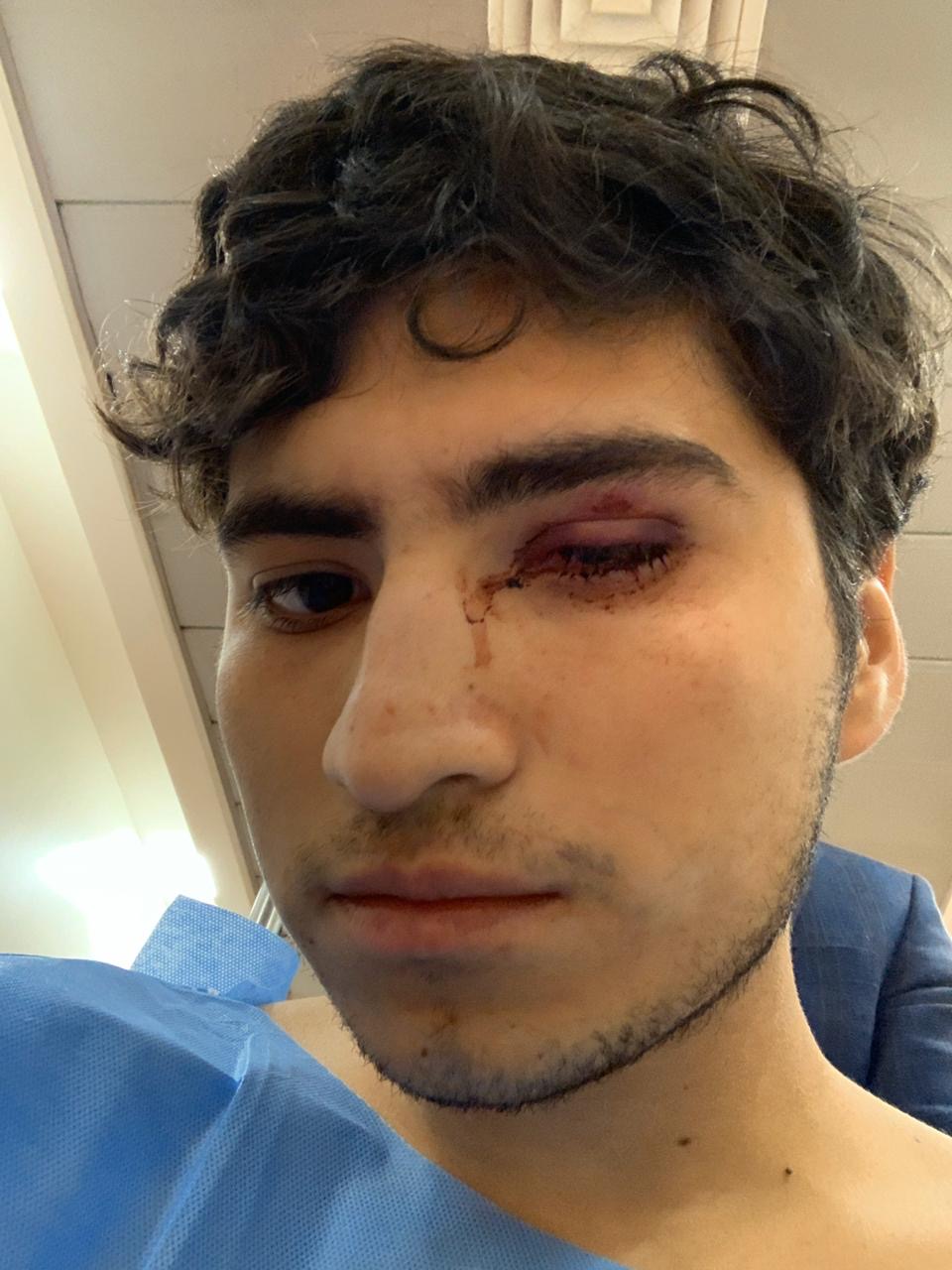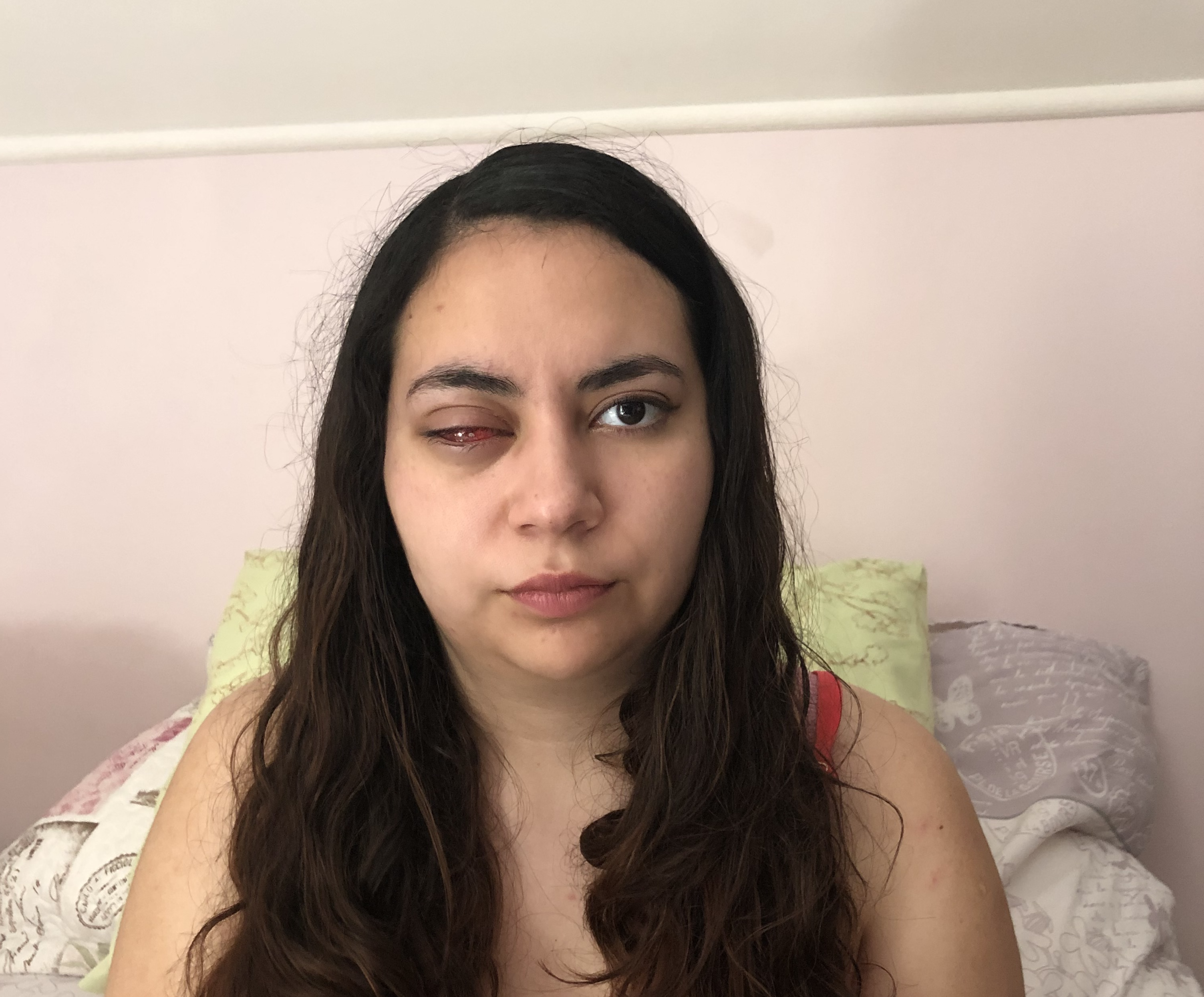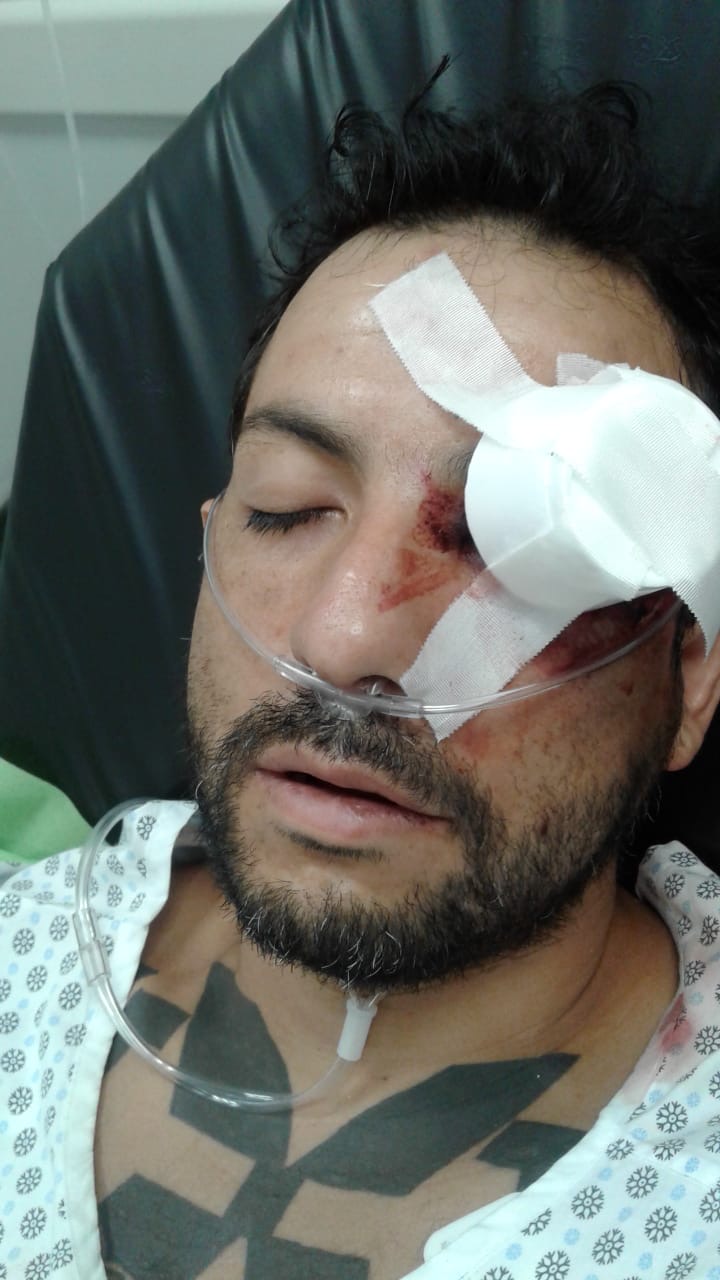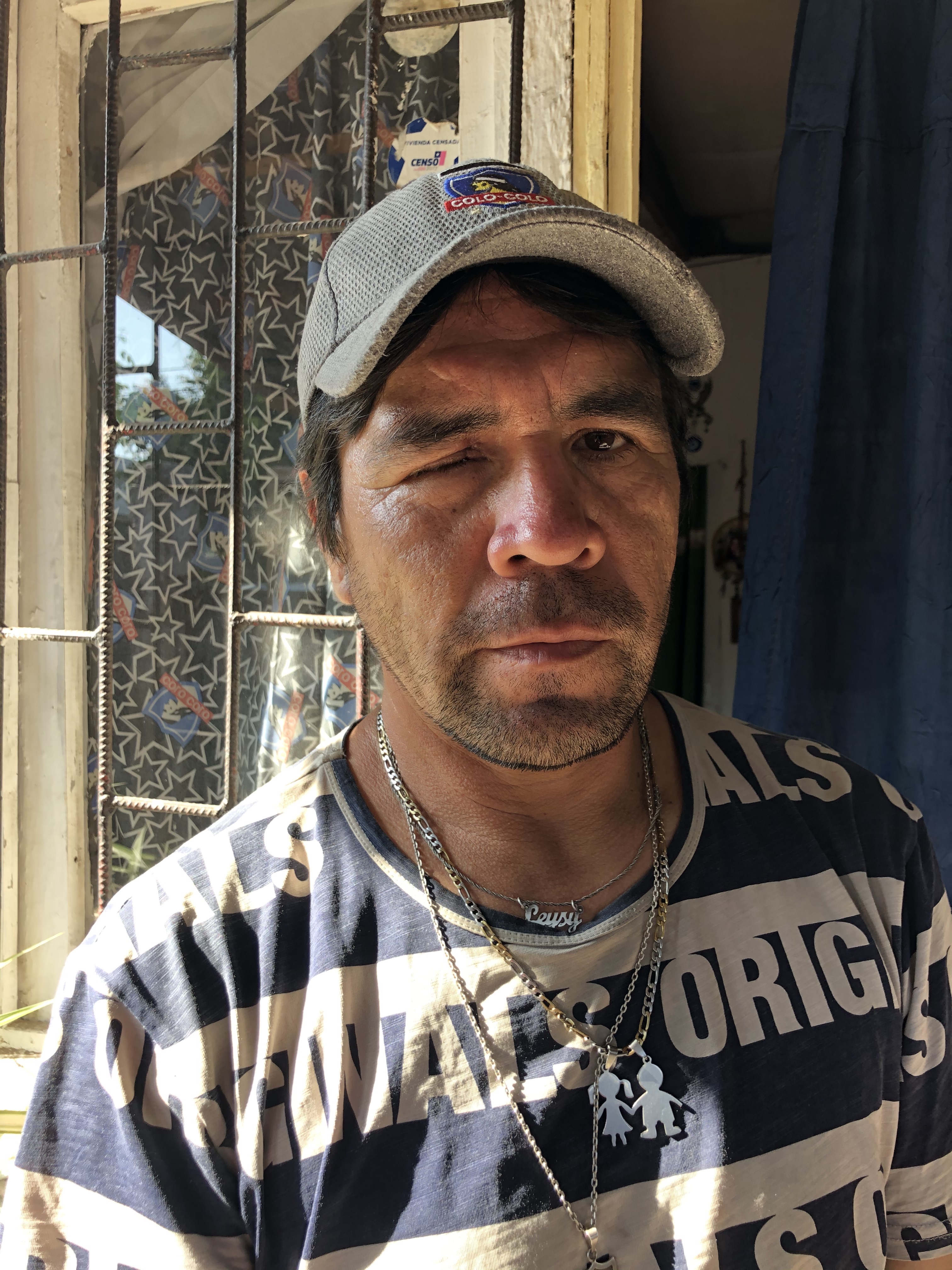One Friday this month, a 21-year-old psychology student named Gustavo Gatica decided to take pictures of a large protest in the Plaza Italia—historically the epicenter of protests in Santiago, Chile. Since protests began there with a one million-person march in October, thousands of people have appeared at the Plaza every day to rail against the extreme economic inequality that ravages the country.
Gatica’s attendance that Friday would change the course of his life. While there, he was attacked by police forces who, unprovoked, shot their pellet guns directly at his face. That day, a picture of Gatica bleeding from both of his mutilated eyes went up on social media and quickly made its way around the country. The gravity of his case has become an emblem of the uncontrolled police violence in Chile.
Gatica is one of 294 protesters in Chile who suffered severe eye trauma from pellets and tear gas canisters shot by police since the protests began on October 18. These many cases of ocular trauma, now considered an emergency with no precedent in Chilean history, suggest the police are violating protocol by shooting directly at people’s faces. Last week, the national police director, Mario Rozas, announced that they would restrict the use of pellets after a study showed they contain dense metals, including lead. Nevertheless, at least 10 new cases of ocular trauma have been reported since then. People have started attending protests with one eye covered in solidarity.
Gatica’s story echoes other protesters’ testimonies of police violence in the local press. They claim the police, seemingly exhausted and full of rage, have erupted into the crowds several times without any warning, and shot indiscriminately. There have been 369 claims of torture, 79 claims of sexual abuse, and 26 deaths, at least 6 directly from police officers, according to the last report by the National Institute of Human Rights (INDH).
“There was no intention on their part to help, even when Gustavo was wounded on the floor,” said Enrique Gatica, Gustavo’s older brother. “People took him out of the square using makeshift shields, as police insisted on continuing to shoot at them.”
Earlier this month, Amnesty International put out a detailed report denouncing the violation of human rights in Chile. The government categorically rejected it. “Let’s say this is cancer, you have to treat it with chemo and along the way, you kill good cells and bad cells,” Enrique Bassaletti, the head of the Santiago Police Department, said in a press conference. This week, Human Rights Watch stepped in, recommended reforming the practices of the Chilean police force.
Last Wednesday, Gatica underwent a second surgery that finally succeed in pulling out the pellets lodged inside his eyes. He was released from the hospital yesterday. Doctors confirmed that he is permanently blind in both eyes. His brother, Enrique, said Gatica is “oddly optimistic, because he's very certain he was fighting for something fair.”
VICE spoke to four other protesters who, like Gatica, have lost their eyes at the hands of the police. Here are their stories.
Diego Foppiano, 22

I live with my family in Puente Alto, on the southern outskirts of Santiago. On October 19, during the second day of protests in the country, the streets were very crowded. There was a big protest planned in the square of my neighborhood, Plaza Puente Alto, so I met a friend at 6 p.m. and we started walking there. The protest had spread all over the avenue and there was a long line of people walking to the spot.
When I arrived, the police were already there. They were just standing and looking at us quietly. I realized that there were only a few of them and I wasn't scared, I didn't think anything would happen.
I stood in front of them and I looked at them directly, and then one of them just stepped out of line and shot me in the face. There was no reason for it. I wasn't even wearing a hood. My face was uncovered. We were all very shocked. We had been in protests before and we had never seen the police using those weapons. Since it was the second day of protests, mine was one of the first cases of ocular trauma. We didn't know they could shoot like that, and they didn't give any warning.
I fell, I lost consciousness and then people surrounded me. While they were trying to help me, police kept on shooting, and many people who assisted me ended up with pellets in their arms and legs. I started walking by myself with the help of my friend to the nearest care center in Puente Alto (SAPU), which does not have sufficient resources, so they sent me to another hospital. The hospitals were so full in those first days that they didn’t have ambulances; I went there with my mom in my uncle’s truck. That day, the state of emergency was declared.
The doctor who treated me said my surgery was one of the longest and most complicated ones. They couldn't get the pellet out of my eye until a month later, in the third surgery, which was last week. I have a constant headache now, so I spend the days mostly sleeping, trying to recover. I tried to go back to school immediately, but I couldn’t stay. I felt very weak and I couldn’t see anything. I’m not getting used to this yet.
I have given some interviews on TV. I’ve been getting trolled on social media; they’re saying nasty things, like I’m faking it or I deserve it. Since I can’t go to the protests anymore I tried to respond to them, but now I think it’s useless. My friends are in the streets right now, they say they’re doing it for me. I appreciate it but I fear for them.
Natalia Aravena, 25

I heard the noise and immediately felt the impact. They shot a tear gas bomb directly at my face. It was intentional—I know because I saw them 5 meters away from me.
They often refer to Chile as a great stable country in Latin America. They show great economic indicators, but people use credit cards to buy food here and they go into debt for 20 years to take out credit to pay for college.
I was meeting a friend at Paseo Bulnes downtown, but I never got there. When I walked out of the subway, I saw a group of people protesting with banners and started to walk through them. They started running, since the police were approaching us very fast and very violently using a water cannon truck. I start running too and got into a small alley, assuming they would stay on the big avenue. It was very difficult to move; there were so many cars and people there. I looked back to see if they were still coming and then I felt the impact.
A paramedic who was assisting people on the streets found me surrounded by a cloud of gas. I was trying to escape but I was stunned, so he took me into a store they were using as a health base, then they cleaned my eye and then I went to the public emergency room, Posta Central.
When I first saw my own eye, it was a little red dot. Being a nurse has helped me so much these days, not to be too obsessed with myself, not to lose my temper. Then, at Clínica Indisa, a private hospital that I could only reach because I have private health insurance, they made me do a light test. I couldn’t see anything. That’s a bad sign. If you don't see any light, there is a very little chance that you will see again. I went into surgery. They sutured my eye and my eyelid, and we waited for a week to see if the eyeball could be saved, but it couldn’t.
As the youngest and only woman of a family of four siblings, I’m overprotected. My family keeps feeling guilty for a thing they couldn’t possibly have anticipated. I’m a pacifist. Many years ago, I became a vegetarian. I try to recycle, not to consume so much when I don’t need to. It is not much, but is my personal attempt to make my existence in the world as harmless as possible. I didn't go out to destroy or hurt anybody. I went out to ask for equality, and in exchange, they mutilated my eye.
Alejandro Muñoz, 36

On Wednesday October 23, I went downtown with my band, as I had many other times since the protests started. It was noon, and we were at the point of Santa Lucia’s Hill, about ten minutes away from Plaza Italia, when the street started to get violent. There was a water cannon truck there, and the police were throwing tear gas bombs to disperse the people.
Before we separated, we hugged each other and wished each other good luck. Then we each started to do our own thing. I was turning off tear gas bombs by collecting them and putting them in plastic water canisters—like many young people do these days, so the rest of the crowd can continue marching without danger. I wasn’t wearing a shield or throwing stones.
One of those tear gas bombs split my eye open. The doctor said I'm alive because I was wearing goggles. Otherwise, the bomb would have gone right through my eye socket. While some kids dragged me across the street into the trees, the police kept on shooting. In fact, they followed us to the doors of the Catholic University Hospital in that neighborhood, where they left me.
I was hospitalized for five days. I was lucky enough to be in that private clinic and instead of emptying my eye, a plastic surgeon saved the eyeball with a little silicone that filled it. I lost vision completely.
I’m in a band called Anarkía Tropical. I'm the band's mascot, which means I use a mask and a costume as a social critique. It is a kind of clown costume similar to the Chilean carnival style. It’s a tribute to an anarchist kid who died 11 years ago. I have to rest for a year now, and the band helped me a lot. They keep playing in the streets.
For me, every day is a new thing. I am starting to get to know what it’s like to live with only one eye. I was a very active person. I'd truly like the protests to continue. But also I want everyone to know what is happening here, that people are being tortured, that women are being raped in police stations, that people are being killed on the streets.
Carlos Puebla, 46

“I don't want to lie to you,” Dr. Torres told me at the Unit of Ocular Trauma of El Salvador Public Hospital, “I'm going to have to empty your eye.” She proceeded to remove the pellet inside of it. Then, she removed my right eye completely. They had burst my eyeball. There was nothing she could save.
On Thursday October 24, a week after the protest started, I left work at 4 p.m. I worked as a construction laborer and I had decided to join the march. I really felt it was my right.
The streets were so crowded. There were families and children in Plaza Italia and we all were jumping, singing and yelling. I remember feeling so happy, so hopeful. Fifteen minutes later and without any provocation, the special forces appeared from Vicuña Mackenna, one of the corners of the square. They started to disperse the people very violently with tear gas trucks and water cannon trucks.
Cases of rape and torture by the police went public that same week. There were so many awfully violent videos of them on the internet. People were so angry, so furious, the situation immediately became chaotic.
As the water cannon approached us, I saw many policemen through the corner of my eye. They were hiding behind a newspaper kiosk 15 meters from me. One of them peered out and I saw him put the gun at his shoulder, he was pointing at my face. I immediately felt the impact. I felt my eye swell and I started to bleed. My face was hot. I ran 5 meters and fell on the ground.
People dragged me to the Red Cross volunteers, just one of the many groups of students and doctors that have organized independently to assist wounded people during the protests. I couldn't breathe. I was scared. I tried to see those people but couldn't open my eyes. While I was there, wounded people kept coming and coming to the spot. One of the paramedics shouted that they needed an ambulance for me. Then I knew it was serious.
I’m waiting now for a prosthesis, which is a kind of contact lens that will firm up the skin of the eye. I'm not the same person, of course. I have nightmares and I lost my sense of space. I’ll have to get a safer job with less pay. I have refused to quit participating in the protests, though. My children join me every time. This can’t end this way.
from VICE https://ift.tt/2QUpelp
via cheap web hosting
No comments:
Post a Comment